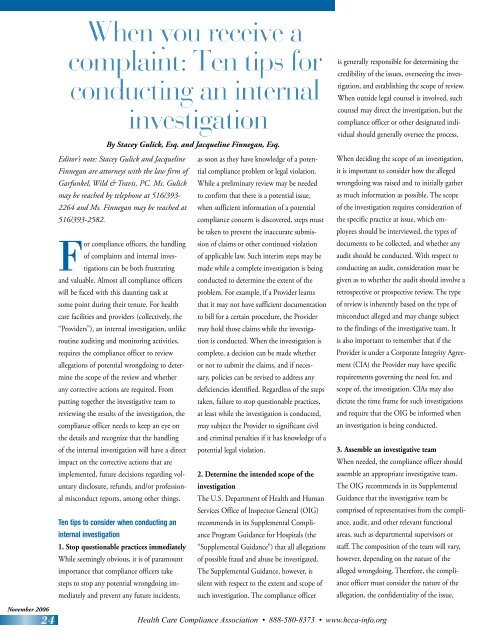Internal Audit and Compliance - Health Care Compliance Association
Internal Audit and Compliance - Health Care Compliance Association
Internal Audit and Compliance - Health Care Compliance Association
You also want an ePaper? Increase the reach of your titles
YUMPU automatically turns print PDFs into web optimized ePapers that Google loves.
By Stacey Gulick, Esq. <strong>and</strong> Jacqueline Finnegan, Esq.<br />
Editor’s note: Stacey Gulick <strong>and</strong> Jacqueline<br />
Finnegan are attorneys with the law firm of<br />
Garfunkel, Wild & Travis, PC. Ms. Gulick<br />
may be reached by telephone at 516/393-<br />
2264 <strong>and</strong> Ms. Finnegan may be reached at<br />
516/393-2582.<br />
For compliance officers, the h<strong>and</strong>ling<br />
of complaints <strong>and</strong> internal investigations<br />
can be both frustrating<br />
<strong>and</strong> valuable. Almost all compliance officers<br />
will be faced with this daunting task at<br />
some point during their tenure. For health<br />
care facilities <strong>and</strong> providers (collectively, the<br />
“Providers”), an internal investigation, unlike<br />
routine auditing <strong>and</strong> monitoring activities,<br />
requires the compliance officer to review<br />
allegations of potential wrongdoing to determine<br />
the scope of the review <strong>and</strong> whether<br />
any corrective actions are required. From<br />
putting together the investigative team to<br />
reviewing the results of the investigation, the<br />
compliance officer needs to keep an eye on<br />
the details <strong>and</strong> recognize that the h<strong>and</strong>ling<br />
of the internal investigation will have a direct<br />
impact on the corrective actions that are<br />
implemented, future decisions regarding voluntary<br />
disclosure, refunds, <strong>and</strong>/or professional<br />
misconduct reports, among other things.<br />
Ten tips to consider when conducting an<br />
internal investigation<br />
1. Stop questionable practices immediately<br />
While seemingly obvious, it is of paramount<br />
importance that compliance officers take<br />
steps to stop any potential wrongdoing immediately<br />
<strong>and</strong> prevent any future incidents,<br />
as soon as they have knowledge of a potential<br />
compliance problem or legal violation.<br />
While a preliminary review may be needed<br />
to confirm that there is a potential issue,<br />
when sufficient information of a potential<br />
compliance concern is discovered, steps must<br />
be taken to prevent the inaccurate submission<br />
of claims or other continued violation<br />
of applicable law. Such interim steps may be<br />
made while a complete investigation is being<br />
conducted to determine the extent of the<br />
problem. For example, if a Provider learns<br />
that it may not have sufficient documentation<br />
to bill for a certain procedure, the Provider<br />
may hold those claims while the investigation<br />
is conducted. When the investigation is<br />
complete, a decision can be made whether<br />
or not to submit the claims, <strong>and</strong> if necessary,<br />
policies can be revised to address any<br />
deficiencies identified. Regardless of the steps<br />
taken, failure to stop questionable practices,<br />
at least while the investigation is conducted,<br />
may subject the Provider to significant civil<br />
<strong>and</strong> criminal penalties if it has knowledge of a<br />
potential legal violation.<br />
2. Determine the intended scope of the<br />
investigation<br />
The U.S. Department of <strong>Health</strong> <strong>and</strong> Human<br />
Services Office of Inspector General (OIG)<br />
recommends in its Supplemental <strong>Compliance</strong><br />
Program Guidance for Hospitals (the<br />
“Supplemental Guidance”) that all allegations<br />
of possible fraud <strong>and</strong> abuse be investigated.<br />
The Supplemental Guidance, however, is<br />
silent with respect to the extent <strong>and</strong> scope of<br />
such investigation. The compliance officer<br />
is generally responsible for determining the<br />
credibility of the issues, overseeing the investigation,<br />
<strong>and</strong> establishing the scope of review.<br />
When outside legal counsel is involved, such<br />
counsel may direct the investigation, but the<br />
compliance officer or other designated individual<br />
should generally oversee the process.<br />
When deciding the scope of an investigation,<br />
it is important to consider how the alleged<br />
wrongdoing was raised <strong>and</strong> to initially gather<br />
as much information as possible. The scope<br />
of the investigation requires consideration of<br />
the specific practice at issue, which employees<br />
should be interviewed, the types of<br />
documents to be collected, <strong>and</strong> whether any<br />
audit should be conducted. With respect to<br />
conducting an audit, consideration must be<br />
given as to whether the audit should involve a<br />
retrospective or prospective review. The type<br />
of review is inherently based on the type of<br />
misconduct alleged <strong>and</strong> may change subject<br />
to the findings of the investigative team. It<br />
is also important to remember that if the<br />
Provider is under a Corporate Integrity Agreement<br />
(CIA) the Provider may have specific<br />
requirements governing the need for, <strong>and</strong><br />
scope of, the investigation. CIAs may also<br />
dictate the time frame for such investigations<br />
<strong>and</strong> require that the OIG be informed when<br />
an investigation is being conducted.<br />
3. Assemble an investigative team<br />
When needed, the compliance officer should<br />
assemble an appropriate investigative team.<br />
The OIG recommends in its Supplemental<br />
Guidance that the investigative team be<br />
comprised of representatives from the compliance,<br />
audit, <strong>and</strong> other relevant functional<br />
areas, such as departmental supervisors or<br />
staff. The composition of the team will vary,<br />
however, depending on the nature of the<br />
alleged wrongdoing. Therefore, the compliance<br />
officer must consider the nature of the<br />
allegation, the confidentiality of the issue,<br />
November 2006<br />
24<br />
<strong>Health</strong> <strong>Care</strong> <strong>Compliance</strong> <strong>Association</strong> • 888-580-8373 • www.hcca-info.org

















